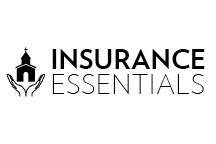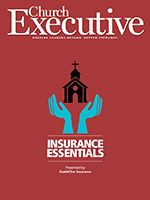 The one constant when purchasing insurance is uncertainty. A few days of unexpected rain can carry in its wake a flood of unwelcome expenses and stress.
The one constant when purchasing insurance is uncertainty. A few days of unexpected rain can carry in its wake a flood of unwelcome expenses and stress.
Thankfully, insurance minimizes the havoc that can occur from such an event.
By Deb Rushenberg
Choosing the right insurance is oftentimes a stressful task. And although insuring a church is similar to that of a traditional business, it does differ in some respects. These differences make choosing the right insurance company rather unique.
A common practice is choosing a company or policy based on price. However, it’s also important to consider your needs and values when weighing different insurance options.
So, how does a church know it’s selecting the insurance company with the proper coverages to fit its needs? The following tips will help.
Research
 Generally speaking, most insurance companies are in excellent financial health; however, doing some homework beforehand is a good idea. A church wants to ensure it can rely on the insurance company it selects. To help aid this process, researching a few topics is typically the best way to get started.
Generally speaking, most insurance companies are in excellent financial health; however, doing some homework beforehand is a good idea. A church wants to ensure it can rely on the insurance company it selects. To help aid this process, researching a few topics is typically the best way to get started.
- Does the company have the right background in providing the adequate insurance for your church needs? This can include property, liability, professional, business auto, health, travel, workers’ compensation and more.
- Will it insure church assets? While general liability insurance will provide the kind of protection a church needs, the organization still has assets that are at risk. A comprehensive package protects against property damage, stolen goods and other threats to the things the church owns. Examples of this include crime coverage, equipment breakdown and sexual misconduct liability.
- Will it grow with your church? Take into consideration the long term. Will your insurance provider help to accomplish the church’s future goals and aspirations? What kinds of additional value-added products and services are offered? Examples of things to look for include risk management tools, assessments, training videos, endorsements and discounts to vendors.
Rating

The best way to check an insurance company’s economic well-being is by looking at its rating. Most privately held companies conduct financial analysis reports and make them available online, in a local library or via the phone. Two of the most popular rating systems are Moody’s and A.M. Best. Although similar in structure, keep in mind that not all agencies use the same rating systems. For example, the best rating at Moody’s is Aaa, but A++ is the top at A.M. Best. Additionally, remember that the rating is comprised of several factors. So, when evaluating two different companies, don’t automatically assume the one with the higher rating is the best choice.
Size
Does size of the insurance company matter? It depends. When a large insurance organization has been around for several decades, customers can be fairly certain that it has a history of meeting long-term obligations, understands the complexities of the business and knows how to manage risk.
However, this doesn’t mean a church shouldn’t consider small-to-medium sized companies. Many have been around for just as long as their competition and are considered experts in the field.
Check complaints
Insurance companies are held to a certain standard and are regulated to prevent mishaps. Throughout the regulation process, complaints from customers are tracked and are available to view. To look up complaints against a particular organization, visit the National Association of Insurance Commissioners’ database.
Use an agent
Typically, most people buy insurance through agents or brokers; churches are no different in this respect. Determining how much and what kind of insurance to buy is one of the most important financial decisions the church will make — and it’s also one of the most complicated. A qualified insurance agent will provide the church with policy recommendations based on a thorough needs analysis.
Working with the right insurance company, with the right policy, can make all the difference in fully protecting a church facility. If the unthinkable were ever to happen, a church should ensure it has the right insurance company to support its values and needs — one that provides the appropriate products and services, has excellent customer service, and has the financial capacity to meet the church’s needs when necessary.
Asking the right questions, doing some homework, and being satisfied that the right decision has been made will help ease fear among the church and its members.
Deb Rushenberg is Director of Commercial Lines Underwriting at GuideOne Insurance in West Des Moines, IA, where she is responsible for the overall vision, direction and oversight of underwriting for the Church niche. Rushenberg has been with GuideOne for more than two decades.


